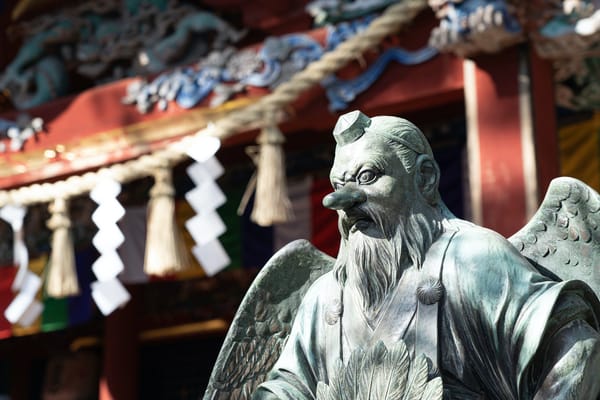Unlearning the Critic: Healing Generational Judgment in Asian Families
How do we break free from the inner voice that was never ours to begin with?

The room hums with quiet tension. The faint scent of jasmine tea lingers in the air, mingling with the low murmur of voices just beneath the surface. In this familiar space — a small kitchen in a modest Tokyo apartment, a bustling household in Seoul, a crowded flat in Hong Kong — words cut sharper than knives, though they rarely sound harsh.
“You could try harder.”
“Why can’t you be more like your brother?”
“Stop being so sensitive.”
If you grew up in an Asian family, these phrases likely echo in your memory. Not because they were shouted, but because they were constant. Casual criticism—sometimes cloaked in care, sometimes simply the language of expectations—became the soundtrack of childhood.
The Quiet Burden of the “Critical Parent”
In many Asian cultures, parental criticism isn’t just a reprimand; it’s a deeply ingrained communication style shaped by history, social values, and family dynamics. Psychologists call this internalized criticism—the habitual tendency to evaluate oneself through a critical internal voice, often inherited from parental attitudes.
According to Dr. Andrew K. Chu, a clinical psychologist specialising in Asian American family dynamics, “Criticism in Asian families often stems from a place of love and a cultural emphasis on self-improvement, but it can leave lasting marks. It’s not just what is said, but what’s unsaid—the expectation that you must be better, stronger, more capable at all times.”
This expectation is rooted in Confucian values of filial piety and collective success. In practical terms, parents aim to prepare their children for a highly competitive world, believing harshness will toughen rather than harm. Yet, science tells us that the psychological reality is more complex.
The Science Behind the Sting
Studies on attachment theory, pioneered by psychologist John Bowlby and expanded by Mary Ainsworth, reveal how early relationships with caregivers shape our emotional regulation and self-esteem. Children raised in environments with frequent criticism often develop a fearful or anxious attachment style, where love is conditional on performance.
In a 2018 study published in the Journal of Child Psychology and Psychiatry, researchers found that consistent parental criticism correlates with higher risks of anxiety and depression in adolescence and adulthood. The brain’s amygdala, responsible for processing emotions like fear and stress, becomes hyperactive in response to perceived rejection.
But criticism doesn’t always come alone. When a child reacts defensively or emotionally, parents might respond with gaslighting: subtly invalidating the child’s feelings with phrases like “You’re overreacting” or “I was only trying to help.” This manipulates the child’s sense of reality and compounds emotional wounds.
Dr. Michelle Lee, a therapist working with second-generation Asian adults, explains, “Gaslighting within families makes it harder to break free from the internal critic because it trains you to doubt your own experience and voice.”
How to Begin Unlearning the Critic Within
This dynamic is generational and self-perpetuating. Children who grow up with harsh criticism may internalise these voices and then repeat them to their own children or themselves, unconsciously continuing the cycle.
Breaking the cycle requires awareness and courage, especially when these patterns are intertwined with cultural identity and family loyalty.
1. Recognize the Internal Voice
Begin by tuning into your inner dialogue — especially in moments of stress, failure, or emotional intensity. Does your voice sound punishing? Global? Morally superior? Phrases like “You always mess this up,” or “You’re so dramatic” are signs of the inner critic. In psychology, this is often referred to as introjected parental voice — criticism we absorbed so deeply, we now repeat it to ourselves.
Try this: when that voice appears, don’t argue with it. Simply name it — “That’s the critic, not me.” This labeling creates psychological distance, which is a core tool in cognitive-behavioral therapy for breaking thought patterns.
2. Understand the Line Between Criticism and Care
Many of us confuse being critical with being helpful. But criticism isn’t just honesty — it’s feedback laced with judgment. It attacks identity, not actions.
A critical inner voice says:
“You’re lazy. You’ll never change.”
A non-critical voice says:
“You didn’t have energy today — what might help tomorrow feel lighter?”
The difference is subtle, but it matters. The first shuts you down. The second opens a door. A good rule of thumb: Would you say this to a friend who’s already hurting? If not — reword it until it feels like care, not control.
3. Practice Compassionate Self-Talk
The antidote to the critic isn’t self-indulgence — it’s self-trust. Shift from judgment to curiosity. From “I’m failing” to “What do I need?” From “I’m not good enough” to “This is hard, and I’m doing my best.” Over time, these words create new neural pathways — ones grounded in safety, not shame.
4. Set Boundaries With Parental Criticism
Even well-meaning Asian parents — many raised on survival, not softness — often default to casual criticism. “You gained weight.” “Why don’t you try harder?” They may not mean harm, but the effect still lingers.
It’s okay to respond with gentle honesty:
“I know you care, but when you say that, I feel small.”
You don’t have to educate them. You don’t have to win. You just have to honour what’s true for you.
5. Seek Safe Spaces to Express Yourself
Growth doesn’t happen in isolation. Whether it’s therapy, late-night voice notes to a friend, or journaling in the quiet hours, find spaces where you don’t need to perform. Places where honesty is allowed to be messy. These spaces become scaffolding for self-trust.
6. Model New Patterns for the Next Generation
When you choose compassion over criticism — especially in moments where you once felt judged — you are actively rewriting generational patterns. Whether you’re parenting children, mentoring younger colleagues, or simply being kind to yourself in public, you are modeling a quieter, more generous kind of power.
The Asian Paradox of Love and Critique
As Dr. Kenji Yamamoto, a sociologist studying Japanese family culture, notes, “The very practices designed to foster success can inhibit emotional expression and create invisible wounds.” referring to a quiet truth many of us have lived: that love in Asian families is often expressed not through affection, but ambition.
Across postwar Japan, Korea, China, and beyond, parenting was shaped by survival and striving. Success — in school, in status, in sacrifice — became synonymous with love. And so came the strategies:
- High expectations around academic and career performance
- Emotional restraint in children positioned as maturity
- Shame quietly used as a tool for obedience or self-correction
- Criticism as motivation — a constant “You can do better”
These approaches weren’t cruel. They were, in many cases, deeply caring — but expressed through control rather than connection. Parents believed they were preparing us to survive a harsh world. What they didn’t see was the cost.
We learned to suppress vulnerability to avoid disappointing them. We internalised anxiety as a normal part of achievement. And we inherited a fear of failure so deep it sometimes masked itself as perfectionism, self-doubt, or numbness. These are the invisible wounds — not scars on the body, but on the voice. The part of us that struggles to say: I’m hurting. I need help. I deserve love even if I fall short.
But this generation is naming what was once unnamed. We are recognising that emotional withholding is not strength. That unconditional love is not earned — and that critique, no matter how culturally familiar, is not always care.
Rewriting Our Stories
If you recognise the echo of these critical voices in your own life, know that you are not alone. The path to unlearning them is neither quick nor easy, but it is deeply freeing. It requires patience, forgiveness, and the willingness to rewrite the stories that shaped you.
Take a moment today to listen inwardly. What does your internal critic say? What would your kinder self say back?
In breaking the cycle, you are not just healing yourself—you are crafting a legacy of compassion for those who come after. This is the quiet revolution of love beneath the surface of Asian family life.
“I used to think my mother’s words were just about discipline. Now I see they were about love—flawed, yes, but love all the same. And I’m learning how to love better.” — Mei
For more reflections on healing, identity, and quiet strength, follow us on Instagram @coulecte and YouTube @coulectejapan. Don’t forget to sign up for our newsletter to get curated content delivered straight to your inbox.





